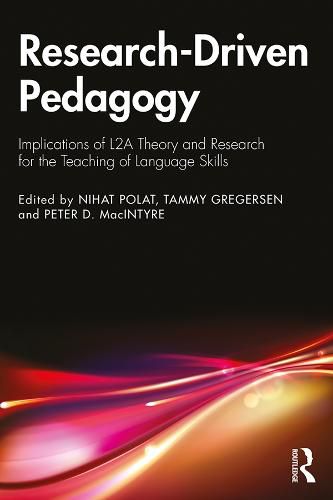Readings Newsletter
Become a Readings Member to make your shopping experience even easier.
Sign in or sign up for free!
You’re not far away from qualifying for FREE standard shipping within Australia
You’ve qualified for FREE standard shipping within Australia
The cart is loading…






Research-Driven Pedagogy: Implications of L2A Theory and Research for the Teaching of Language Skills brings together the essentials of second language acquisition (SLA) theory, research, and second language (L2) pedagogy. Uniquely, the design of this book helps researchers and practitioners make explicit connections between theory, research, and practice; learn about and conduct classroom research to contribute to the relevance and applicability of SLA research; and improve current L2 curriculum and instruction in light of current theory and research.
The volume offers critical reviews of the most relevant, current SLA theory and research about receptive, productive, complementary, and nonverbal communication skills, as well as willingness to communicate (WTC). Each chapter is formatted to include five major topics about each language skill: (1) major theories, (2) critical reviews of salient/current research, (3) commonly-used data collection and analysis techniques, (4) summary of specific pedagogical implications of pertinent research and theory, and (5) theory and research-driven scenarios/activities that can be used in teaching.
A teacher or a researcher can pick any chapter in this volume to learn about the most important language skills (e.g., reading, writing, nonverbal communication), while having all-in-one place access to almost everything they would need.
$9.00 standard shipping within Australia
FREE standard shipping within Australia for orders over $100.00
Express & International shipping calculated at checkout
Research-Driven Pedagogy: Implications of L2A Theory and Research for the Teaching of Language Skills brings together the essentials of second language acquisition (SLA) theory, research, and second language (L2) pedagogy. Uniquely, the design of this book helps researchers and practitioners make explicit connections between theory, research, and practice; learn about and conduct classroom research to contribute to the relevance and applicability of SLA research; and improve current L2 curriculum and instruction in light of current theory and research.
The volume offers critical reviews of the most relevant, current SLA theory and research about receptive, productive, complementary, and nonverbal communication skills, as well as willingness to communicate (WTC). Each chapter is formatted to include five major topics about each language skill: (1) major theories, (2) critical reviews of salient/current research, (3) commonly-used data collection and analysis techniques, (4) summary of specific pedagogical implications of pertinent research and theory, and (5) theory and research-driven scenarios/activities that can be used in teaching.
A teacher or a researcher can pick any chapter in this volume to learn about the most important language skills (e.g., reading, writing, nonverbal communication), while having all-in-one place access to almost everything they would need.